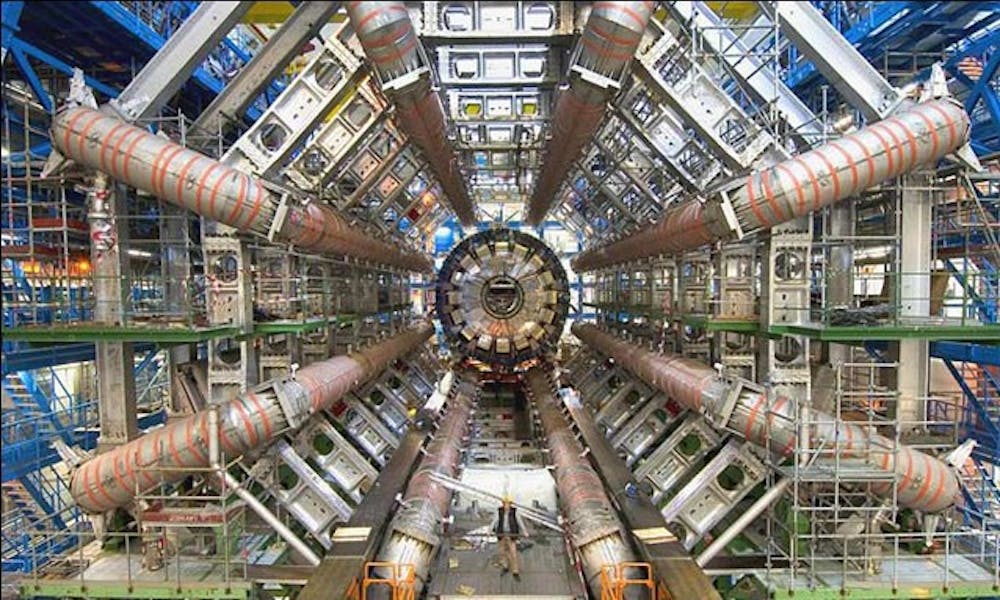The future of physics is being shaped in a concrete tunnel 574 feet beneath the border of France and Switzerland—and Duke is playing an important role.
Professors and students from the University are contributing to the progress being made at the Large Hadron Collider (LHC), the world’s largest particle accelerator. The European Organization for Nuclear Research (CERN) built the LHC in order to test various theories of high-energy physics and especially to check for the existence of the Higgs boson—an elementary particle often called the “God particle” by the media due to its hypothesized importance in explaining the Big Bang Theory.
“During the past 20 years we have reached an impasse. Established theory can explain all measurements, but it does not explain why our universe on the whole looks the way it does,” said James B. Duke professor of physics Berndt Mueller. “The hope is that the LHC will provide the data that are needed to decide what the correct extension of our current understanding of nature is. The competing theories go under the name supersymmetry, technicolor, additional dimensions and so on. I would not be surprised if none of them turn out to be right.”
The Duke professors of physics involved in the research include Steffen Bass and Thomas Mehen, who are working on theory, and Ayana Arce, Alfred Goshaw, Ashutosh Kotwal, Mark Kruse and Seog Oh, who are focusing more on experimental work, Mueller noted. The physics department is also sending several undergraduate students to work at the LHC this summer, he added.
He said he believed the collider can further physicists’ understanding of how the universe was created and can possibly reshape physics forever.
“The LHC accelerates atomic nuclei to extremely high energies and collides them,” Mueller said. “This makes it possible to study processes that only occurred during the Big Bang when the universe was extremely hot.”
Thousands of scientists are collaborating on this project, and their responsibilities vary from monitoring malfunctioning sensors to studying the effects of collisions between particles, said Arce, assistant professor of physics.
Arce is using the ATLAS detector—a 7,000-ton instrument designed to examine the collision of protons in the LHC to uncover new types of particles or new ways that particles interact.
“Every collision is different, but most of them involve familiar particles—the quarks inside protons, as well as electrons, neutrinos, photons and their ‘cousins’—and the results can be predicted by existing theoretical models,” Arce said. “My colleagues and I want to find collisions that we can’t explain with these theories.”
Junior Zach Epstein is working under Kotwal this summer on the ATLAS detector studying particle decay.
“The ATLAS experiment is a huge thing within the LHC and hundreds of people are working on it,” he said. “It is exciting to have the opportunity to work on this. At the same time, it is important to realize that this is just a small piece in the puzzle. Answering the big questions will take a long time.”
Mehen, associate professor of physics, said in time, the LHC could help solve some of physics’ most enduring questions.
“I think that there are a lot of interesting theories postulated [in physics], and I have worked on some of them, but I think that what is really interesting is the opportunity to obtain new experimental data [from the LHC] which may address long-standing questions,” said Mehen. “Theorists have been speculating for decades about what will happen at the LHC—it is time for us to listen to what nature will tell us.”
Although disputes are more often the rule than the exception in physics, the university’s professors all agreed on one thing—whatever happens at the LHC, the future of physics is bright.
“These are very exciting times in physics, and especially particle physics now that the LHC is working extremely well,” Kotwal said. “Any new discovery at the LHC will be a game-changer, and with multiple discoveries possible, we may soon have a whole new paradigm in sub-atomic physics.”
Get The Chronicle straight to your inbox
Signup for our weekly newsletter. Cancel at any time.

